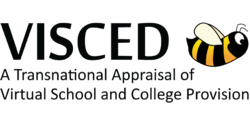Welcome to the Virtual Education Wiki ~ Open Education Wiki
2022 Main Page
Admin area
Welcome to virtualeducation.wiki
> REPORTS for key reports
> VISCED - virtual schools reports and deliverables
> Re.ViCa - virtual universities/campuses reports and deliverables
> POERUP - open educational resources reports and deliverable
This wiki - now called virtualeducation.wiki - is, we believe, the largest professional wiki in the world devoted to virtual learning in education - at all levels (schools, colleges and universities) including informal learning, open learning and distance learning.
The idea behind this wiki was to create an open and public space where researchers could share information about virtual developments in various different educational sectors. It was supported and maintained by a community of researchers and was aimed at stakeholders, researchers and practitioners who wanted to have easy access to the latest information about how the virtual phenomenon is manifesting itself in schools, colleges and universities around the world.
It is curated by Paul Bacsich and hosted by the Catholic University of Leuven (K.U.Leuven).
News
July 2020 - VISCED-20 project
From 1 June 2020 the Dualversity team have been working on a short project VISCED-20 (June-September 2020), a pilot for a proposed longer study, but one which aims in this phase to provide useful information to schools, policy experts and ministries across Europe trying to cope with the situation of whole or partial school closure and online teaching during the Covid-19 pandemic. In some countries, Covid-19 is very likely to affect next school year also, for example reducing the choice in the curriculum due to classroom constraints and fewer staff. Moreover, pandemics can recur, not to mention other natural disasters – countries have learned the hard way that we need to be better prepared.
The VISCED-20 project is studying the actual and potential contribution of the Virtual school sector to these issues of resilient educational systems at school level.
For more details see VISCED-20
February 2020 - Limited edits
This wiki is now the archive wiki for the Re.ViCa, VISCED and related EU LLP projects and is now closed to external requests for editor rights.
Limited edits are being made by the Curator in order to ensure that invalid links are corrected and that the reports from the Re.ViCa, VISCED and other projects hosted on this wiki are still available. (Many associated sites are no longer active.)
This wiki has been used as the resource wiki for new online courses for teacher training (the TTTOL project) which started in May 2019.
If anyone is interested in continuing to edit please contact the Curator paul.bacsich AT sero.co.uk to discuss arrangements for them to gain editing rights on the new wiki http://virtual-learning.referata.com
Please also notify the Curator at the above email address if you find any invalid links on this wiki.
Earlier news
See News.
Key links
Funding
This wiki is currently supported financially by Matic Media Ltd. The wiki is hosted by K.U.Leuven.
Funding to launch this wiki came mainly from the Lifelong Learning Programme of the European Commission through projects relevant to virtual learning. In addition, a series of smaller initiatives and volunteer labour aimed to keep updating the material. (See in particular E-World and LUOERL.)
|
This wiki is currently maintained under the Exploitation Phase of the VISCED project on Virtual Schools and Colleges (funded by LLP in 2011 - 2012), which made an inventory and carried out a systematic review at international and national levels of innovative ICT-enhanced learning/teaching "Exemplar" initiatives and "e-mature" major secondary and post-secondary education providers for the 14-21 age group. VISCED enhanced Re.ViCa's earlier research work on this wiki on country reports and resources with research results relevant to virtual schools and exemplars. Read more here. |
Originally set up in 2007 by the Re.ViCa project on Virtual Campuses in universities and colleges (2007- 2009), this wiki started out with providing an inventory and showing the results of a systematic review of Virtual Campus initiatives of the past decade within higher education throughout the world. In 2009, Re.ViCa research pages on this wiki included over 300 categorised Programmes, Country reports, nine in-depth Institutional reports and a large number of related Resources (research projects, outputs, and publications). Read more here. |
POERUP has put some material on this wiki but most is on its own POERUP wiki.
It is planned one day to integrate all such wikis on a new platform but only limited progress has yet been made.
Disclaimer
The Editorial Team makes every effort to ensure, but does not guarantee, the accuracy of the information on this wiki, but we warmly invite anyone who sees incorrect information to let us know. You can read more information on this topic here.
There has been no systematic updating of material since 2013. However, this wiki remains the only comprehensive source of information on virtual schools, colleges, campuses and universities known to us and has been used as the starting point for many EU, national and international research studies and teaching activities since then, up to and including the current day.
|
This wiki was originally partly funded through the EU Re.ViCa project (2007-2009), then through the EU VISCED project (2011-2012), and finally though the EU POERUP project (2011-2014) with support from the European Commission through the Lifelong Learning Programme. The wiki reflects the views only of the authors, and the European Commission, European Parliament or any other funders commercial or state cannot be held responsible for any use which may be made of the information contained therein. |


